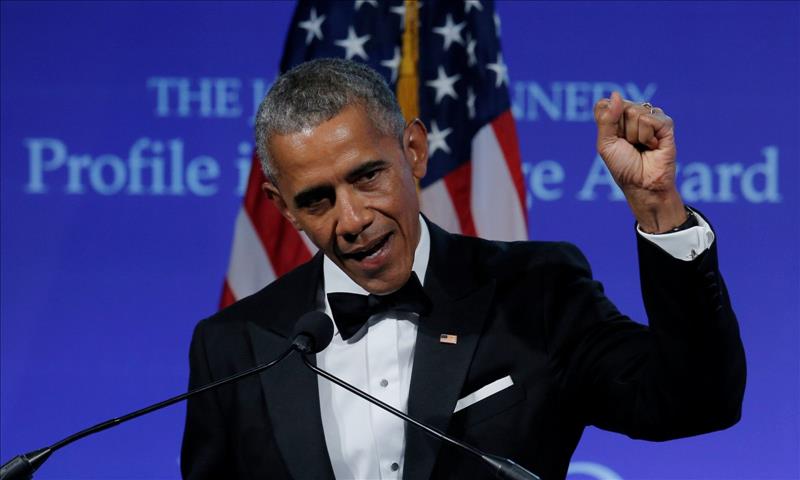
Obama set precedent for abusive surveillance
Donald Trump was ridiculed in March when he made this tweet: 'Terrible! Just found out that Obama had my ‘wires tapped' in Trump Tower just before the victory. Nothing found. This is McCarthyism.'
CNN and MSNBC dismissed the US president's allegations, but now that the Federal Bureau of Investigation (FBI) did indeed wiretap Paul Manafort, manager of Trump's 2016 election campaign, with the likelihood that his conversations with Trump were unmasked as well. It's possible then-president Barack Obama didn't know this was happening, but even so, such revelations must be raising the eyebrows of allies such as South Korea, Japan, the Philippines and Vietnam. Were they also being spied on by the Obama administration's surveillance apparatus, and if so, why?
The DailyBrief Must-reads from across Asia - directly to your inboxIt sows doubt in the minds of Asian leaders moving forward when they consider assisting the United States with the North Korea crisis, the South China Sea dispute and the US-led world order that has been in place since the end of World War II.
Top Obama intelligence and national-security officials who wiretapped Americans and foreigners without proper Foreign Intelligence Surveillance Act (FISA) court warrants haven't been thoroughly questioned about why they took these actions.
High-ranking Obama officials allegedly caught abusing intelligence practices included his United Nations ambassador , who supposedly tried to ' American citizens on a daily basis', former Central Intelligence Agency (CIA) director , and former national security adviser Susan Rice. Former director of national intelligence James Clapper and former acting attorney general Sally Yates have both that they reviewed communications of political figures secretly collected under Obama's presidency.
Among the most damning revelations is the that US intelligence agencies secretly monitored conversations of members of Congress while the Obama administration the Iran nuclear deal.
Seemingly, US intelligence agencies had been politically weaponized, and that has far-reaching implications for how Asian allies will trust the CIA, FBI, National Security Agency, US Justice Department and the White House itself.
These actions a FISA Court judge to accuse the NSA of 'an institutional lack of candor'.
So, is it outside the realm of possibility that Asian or other allies working with the US on the North Korea problem might ask if they are being spied on without their knowledge by the Trump administration? Not at all, since the precedent has been established.
Privacy concerns for domestic and foreign interests coinciding with abusive intelligence activities are ruining the United States' ability to present cogent intelligence to Asian allies.
US allies in Southeast Asia should be asking what the US did or is currently doing to undermine their governments and policies through secret wiretaps and surveillance. With China on the march throughout Asia, these actions have consequences that affect billions of people.
The bigger issue isn't Trump's tweets saying Obama spied on him, rather it's that foreign and US media along with quasi-news sites have continually published false and misleading quotes and stories denying his allegations. What needs to be reported is that Asian allies that have the most to lose from North Korea's nuclear program won't trust the US any more to stick by its agreements or deal with them truthfully, and might even undermine them through illegal surveillance activities.
In light of the geopolitical earthquakes taking place in North Korea, Russia, Iran, Syria – and the brewing war between Shiite and Sunni interests in the – why would any ally, or current foe that could be turned into an ally, trust the United States?
Asian allies spread the blame all around when it comes to US intelligence incompetence: the deep state, Obama administration holdovers, Trump tweets and enemies or unchecked intelligence agencies. But privacy concerns for domestic and foreign interests coinciding with abusive intelligence activities are ruining the United States' ability to present cogent intelligence to Asian allies working against the North Korea threat, or dealing with the disputes in the South China Sea.
FISA warrants, which originally were meant to target 'foreign spies inside the US', now have far-reaching legal power and an entire surveillance apparatus. FISA Section 702 as an example allows collection of data from Google, Facebook and other social-media sites if it is deemed that a foreign power or individual is under investigation.
Asian countries lead the world in technology, mobile=phone use and social-media savvy, which puts them directly at risk of US spying. The FISA law expires on December 31, and Asian allies should begin furiously lobbying the Trump administration and Congress against continued abuses affecting their countries and their governments' sovereignty.
If this unlawful behavior moves forward unabated, rogue regimes across the world will continue to believe the US and its allies are weak and ripe for the taking. Vladimir Putin, Xi Jinping, and Iran's Islamic Revolutionary Guard will take advantage of apparent US weakness to detriment of America's allies.
Top current and former US administration officials seem satisfied to let this behavior slide without thinking of the geopolitical consequences. Instead of mocking President Trump's tweets, especially those that happen to be true, consider that Asia may find it necessary to make its own pivot away from the US and the post-World War II order in light of these intelligence abuses.
Asia Times is not responsible for the opinions, facts or any media content presented by contributors. In case of abuse, .
Legal Disclaimer:
MENAFN provides the
information “as is” without warranty of any kind. We do not accept
any responsibility or liability for the accuracy, content, images,
videos, licenses, completeness, legality, or reliability of the information
contained in this article. If you have any complaints or copyright
issues related to this article, kindly contact the provider above.


















Comments
No comment